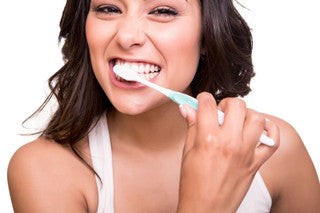If you are having difficulties removing plaque, tartar or stains from your teeth, have you taken a close look at what your nightly dental care routine is? Most of us are rushed in the mornings and busy during the day, so properly caring for your teeth during work hours can be challenging. Therefore, when you get home, you should spend extra time to ensure you are properly caring for your oral hygiene.
According to the American Dental Association, we should brush our teeth ideally after each meal and at least twice a day. However, proper dental care and practicing good oral hygiene goes beyond just brushing your teeth.
For example, have you ever considered what you're brushing with? If you are using traditional toothpaste, you should strongly consider using a dental gel that specifically targets the removal of tartar and plaque. These can be good options for getting the most out of your nightly dental care. A dental gel that prevents tartar and removes plaque buildup is a great way to protect and strengthen your teeth.
Here's a few quick tips to ensure your nightly dental care routine is serving you well.
1. Be Diligent About Brushing
Whether you're brushing with tartar removing toothpaste or plaque removing dental gel, consistency is key. Be diligent about your nightly routine ensuring that you focus on the front, back and both sides of your mouth for at least 2 minutes.
Using the right product and allotting the proper amount of time and being consistent is the most important part of any dental care routine.
2. Consider Electric Toothbrushes
Whatever type of dental gel you use, think about the brush you put it on. The same tartar removing toothpaste placed on an electric toothbrush rather than a manual one will have a better chance at being effective. Electric toothbrush bristles vibrate or rotate to help you remove plaque buildup from your teeth and gums. The vibration allows for more micro-movements every time you move your toothbrush across your teeth. Plus electric toothbrushes are less abrasive on your gums.
3. Rinse & Repeat
Use mouthwash every night. According to Healthline.com there are two types of mouthwashes: cosmetic and therapeutic.
Cosmetic mouthwashes control bad breath temporarily and leave a pleasant taste in your mouth. Therapeutic mouthwashes include ingredients that provide long-lasting bacterial reduction and can be used for conditions such as receding gums, gingivitis, dry mouth, and plaque buildup. They’re available over-the-counter and by prescription. Check the mouthwash label for the ADA Seal of Acceptance. It means that it’s been tested for effectiveness. Not every mouthwash has it, including some with well-known names.
4. Don't Forget Your Tongue
Spare a moment while brushing for your tongue. Sure, tartar removing toothpaste and dental gel is generally meant for your teeth, but your tongue can build up a lot of bacteria as well. Brushing your tongue when you're brushing your teeth can add an extra layer of defense after plaque and other nasty build-ups. Make this part of your nightly dental care routine. It may feel odd at first, but it will soon seem as ordinary as brushing your teeth.
Bonus tip: Account for Your Diet
It's not just how we brush, but also what we eat that impacts our dental health. This is especially important closer to bedtime. If you are eating sugary things close to bed, that sugar can linger on your teeth overnight and help bacteria to grow.
Make sure that brushing your teeth with tartar removing toothpaste is the last thing you do before bed. Try to be mindful about snacking too close to bed, as this can throw off your nightly dental care routine as well. Brushing after meals is critical to keeping your teeth healthy, especially at the end of the night.
Stick to the Plan
No matter what nightly dental care routine you settle on, make a plan and stick to it. Ultimately, maintaining a regular routine can be the best defense against plaque and tartar.

